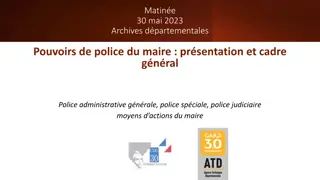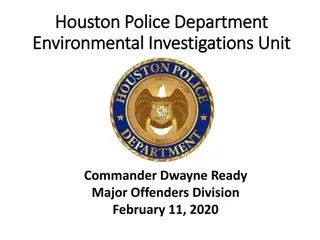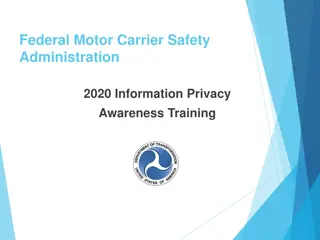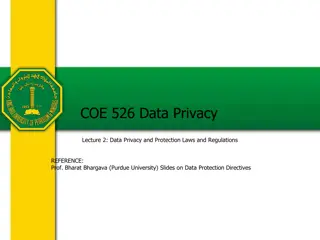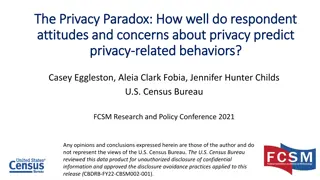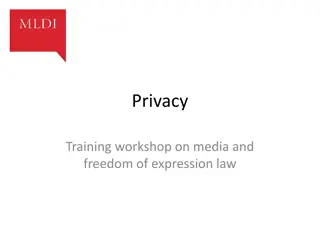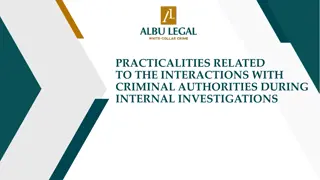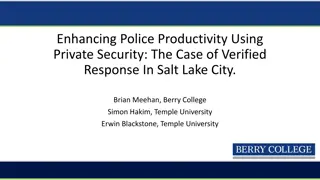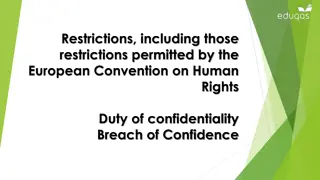Balancing Health Care Privacy and Police Investigations
Learn about the policies and procedures for working with law enforcement in health care settings, including privacy rights, disclosure of information, and cooperation with police during investigations. Understand the delicate balance between patient confidentiality and supporting police inquiries.
Download Presentation

Please find below an Image/Link to download the presentation.
The content on the website is provided AS IS for your information and personal use only. It may not be sold, licensed, or shared on other websites without obtaining consent from the author.If you encounter any issues during the download, it is possible that the publisher has removed the file from their server.
You are allowed to download the files provided on this website for personal or commercial use, subject to the condition that they are used lawfully. All files are the property of their respective owners.
The content on the website is provided AS IS for your information and personal use only. It may not be sold, licensed, or shared on other websites without obtaining consent from the author.
E N D
Presentation Transcript
POLICE INVESTIGATIONS WHEN THE POLICE COME KNOCKING PRESENTER: SHARI FISH PEC CLINICAL EDUCATION DAY DATE: Mar 18th& 24th, 2016
Agenda Policies Working with the police Privacy and Confidentiality Disclosure of Information Reporting a Crime Warrants and Arrests Police Interview Requests
POLICY 2.26 Police Investigations
Policy Statement In the provision of health care institutions and professionals frequently come in contact with law enforcement authorities When care is provided to alleged offenders and victims the institution and treating professional have information that is relevant to the patient s health care and may be relevant to a police investigation of the facts and circumstances of the injury Cooperation with police must be balanced against the patient s right to confidentiality of their health care information
Policy Statement continued Institutions and health care professionals should not disclose confidential information to the police unless required by law to do so or with the patient s consent In the absence of consent, physicians and staff should not perform any test or treatment solely in response to a police officer s request except in the context of a warrant Police enquiries should be directed to the manager on duty
Different Duties Balancing Act Health Care Providers Duty to treat Treating the patient and respecting their privacy Privacy is the patient s right Police Duty to enforce the law Investigate Arrest Cooperating with police Protecting the patient (and society) where the patient poses a risk to self or others
WORKING WITH POLICE - TRUE OR FALSE
Question # 1: You have a legal duty to assist the police False Generally no obligation to assist police without court process such as a warrant or subpoena
Question # 2: It is a criminal offence to obstruct police in their investigations True You must not resist or willfully obstruct police in the execution of their duties. Do not mislead, deceive or in any way hinder the police
Question # 3: When presented with a warrant, you can release unlimited information to the police False Information provided must be within the scope of the warrant and no more
Question # 4: A health care professional may breach patient confidentiality when required to give testimony in a court of law True If you have received a summons to testify in court you are authorized by law to disclose patient information
Question # 5: If a patient admits committing a crime to you, you are obliged to tell the police False There is no general legal obligation to report a crime (there are some exceptions to this rule which we will discuss)
Question # 6: If a sexual assault victim presents you are entitled to tell the police False Disclosure to the police requires consent
Question # 7: A warrant authorizes police to have a blood sample drawn/taken from a capable patient without patient consent True However, if a competent patient refuses to comply with a warrant, staff have no legal obligation to force a patient to comply
Search Warrants Without patient consent this is the procedure that the police should use for obtaining patient records and specimen samples in the hospital s possession The warrant provides the police legal authority to search for and seize evidence Once police have the warrant they will attend at the hospital to enforce it It is important to comply with a search warrant when presented The hospital and its staff are obliged to assist the police as required by the warrant
Health Record Release Requires signed patient consent or a warrant The warrant becomes part of the health record Only information specified should be released Police can seize the original health record with a warrant Health records staff are authorized to release personal health information to police on receipt of a valid warrant or court order
PRIVACY AND CONFIDENTIALITY
College of Nurses Confidentiality involves keeping personal information private. All information relating to the physical, psychological and social health of clients is confidential, as is any information collected during the course of providing nursing services. Clients, however, may consent to sharing information with others. CNO Practice Standard, Ethics (Revised 2009)
Canadian Nurses Association When nurses are required to disclose information for a particular purpose, they disclose only the amount of information necessary for that purpose and inform only those necessary. They do so in ways that minimize any potential harm to the individual, family or community. CNA Code of Ethics for Registered Nurses (2008)
Duty to protect patient information Patients have a right to their privacy Health care staff are bound by patient confidentiality Privacy legislation (applies in all provinces and territories) reinforces duty to keep patient information confidential, therefore An individual s consent is required before his/her personal and personal health information can be collected, used or disclosed
Exceptions When there is a significant and probable risk of imminent serious physical harm to someone, either the patient or a third party, the health care provider is under an obligation to use reasonable care to protect that person This obligation can include warning the intended victim or notifying the police If it is genuinely believed that there is serious risk of serious harm to third parties, disclosure may be made to protect the third party even if it involves a breach of confidentiality
What is Permitted Disclosure? When consent of the patient/SDM is obtained for the release of information to third parties Best practice is to obtain written consent When legislation requires reporting e.g. child abuse/neglect Child and Family Services Act When authorized by law Court order or warrant Ensure that those seeking access to information have the requisite authority before providing information When disclosure of information is necessary to reduce a significant risk of serious bodily harm to the patient or third parties
Disclosure of Information related to a deceased patient Information may be disclosed to law enforcement about a person who is deceased for the sole purposes of: Obtaining assistance in identifying the individual Obtaining assistance to identify the deceased individual s next of kin or any other person who would be reasonable to inform that the individual is deceased, and the circumstances of the death when appropriate Only the information that is necessary and relevant for the purposes of determining identity of the patient or the patient s next of kin can be disclosed to law enforcement
Risks of Improper Disclosure or Cooperation Police Risk In the criminal action evidence can be excluded at trial Health Care Risk Privacy complaint under PHIPA, that you breached privacy and confidentiality under the Act Civil Action a civil lawsuit could be brought by patient for breach of privacy Professional a complaint could lead to an investigation by a regulatory body and a discipline proceeding
Reporting Crime If during attendance for treatment of injuries a patient discloses to staff that a crime has been committed, there is no legal obligation to report There is legal obligation to report: a gunshot wound suspicion that a child is being physically, sexually, or emotionally harmed or neglected to the Children s Aid Society (CAS) sexual abuse by a health professional to the health professional s respective regulatory body and the unit leader, risk department or Administrator on Call Some statutes require reports but not to the police Child and Family Services Act Coroners Act Highway Traffic Act
Mandatory Gunshot Wounds Reporting Act Came into force September 1, 2005 Mandatory disclosure of gunshot wounds by every facility that treats a person for a gunshot wound The premise of the regulation is that a gunshot wound results either from a criminal act or as a result of inappropriate use or storage of a firearm Disclose to police The fact a person is being treated for a gunshot wound The person s name (if known) Name and location of facility Disclosure must be made orally and as soon as it is reasonably practical to do so without interfering with treatment or disrupting regular activities of the facility
WARRANTS AND ARRESTS
You have been presented with a search warrant Request to inspect the warrant to determine its parameters Depending on terms of warrant, police may be entitled to actually search a patient s room or other locations of the hospital Provide the information covered by the warrant and nothing more! Document compliance with the search warrant - put a copy on the patient s chart (as per organizational policy)
Taking Specimen Samples General rule of thumb: No tests, procedures or treatment without patient consent In situations where the patient is unable to consent to the taking of blood samples related to both alcohol and drugs, the police officer can ask a Justice of the Peace for a warrant to obtain blood samples Blood samples may be taken under the direction of the warrant Staff may respond to inquiries about whether a sample has been taken from the patient however disclosure of the sample and/or results is prohibited without written consent or a warrant
Samples at Request of Police The law expects individuals to comply with the warrant but if a capable patient refuses staff are under no obligation to force a patient to comply In the absence of a warrant, a written informed consent is required from the patient, if capable, for taking a sample for purposes other than health care/treatment An SDM is not authorized to consent on behalf of the incapable patient to the taking of samples for purposes other than patient care/treatment therefore warrants must be obtained and produced before samples can be taken from an incapable patient
Blood Alcohol Testing Specimens for blood alcohol levels drawn for non-clinical purposes must be drawn using Blood Alcohol Kits provided by Ontario Ministry of Solicitor General These kits must/will be supplied by the police officer
Photography of a patient Law enforcement who want to photograph or use audio/video taping of a patient for police purposes must have written consent from the patient/SDM or a warrant to do so unless the patient is under arrest In cases of suspected child abuse the hospital must receive a subpoena or other legal process prior to releasing photography and audio/video tapings to a third party unless the patient or SDM provides a written consent If the police or CAS request photographs of a suspected child abuse victim staff should recommend that a police photographer be contacted for that purpose
Evidence in police cases Police need to be able to prove the chain of custody of any evidence That the sample actually came from the accused person That the bullet was actually the one removed from the victim That the paint flecks on the clothing actually came from the patient And not someone else treated in the ER that day Think about how you take and identify samples, patient belongings, etc. Health care always comes first, but you should take into consideration preserving evidence if providers are suspicious about the circumstances of an injury or death
Arrests and Warrants for Arrest The police do have the right to enter a hospital in order to make an arrest Once a patient has been arrested the powers and duties of the officer expand The officer has the right to: Search the person arrested Search the immediate surroundings Take any property which is reasonably believed to be connected with the offence The officer has a duty to guard individuals under arrest to ensure they do not escape or cause further damage Hospital staff must not interfere with the exercise of the police officer s duty
Police with a warrant for arrest The police officer can be informed of the following: That the person is a patient in the hospital His/her location within the hospital His/her general health status using such terms as poor, fair, critical We will also comply with requests to keep the police informed when the patient is moved to a different location and/or will be ready for discharge
Remember Police have a job to do as well Guard suspects Talk to victims Gather evidence Therefore, let them do their job if you can without compromising health care
Police Request Interview with Patient Access to the patient is contingent on the medical condition of the patient and the patient s consent Unless the patient is under arrest, staff must obtain verbal consent from the patient (if capable) as patient is not obliged to speak with the police Staff should not permit access to the patient until verbal consent is obtained Staff must document in a Focus note in the health record that the patient has consented or refused
Police Request to Interview Staff Staff recollections of patient s health care are confidential Participation is voluntary unless served with a summons, subpoena or Coroner s warrant to appear in court Must not breach patient privacy Provide factual information only Requests for interviews should be directed to the manager, Risk Department or Administrator on Call All interviews should be scheduled/planned during regular business hours
What staff can say Confirm whether there is a legal obligation to speak to the police Patient consent Court order Warrant If police have already obtained a copy of the patient s medical record via a warrant Do not disclose information about staff such as telephone numbers, addresses or schedules to law enforcement If you are not sure that police have the appropriate documentation please do not hesitate to contact the Risk Management office or the Release of Information Office in health records
The Best Answers Please let me speak to my manager I have to obtain patient consent I would be pleased to assist, but I need to see the search warrant Then call: Physician Manager/Administrator on Call Risk Management Department


